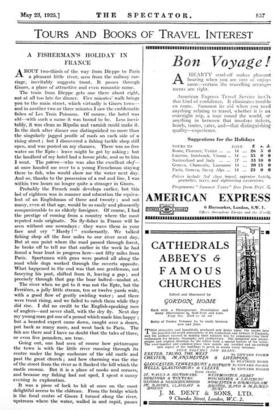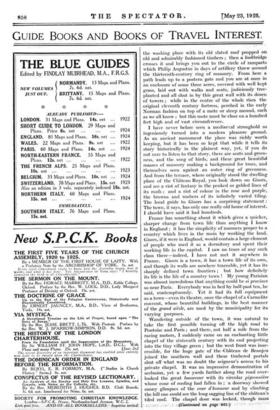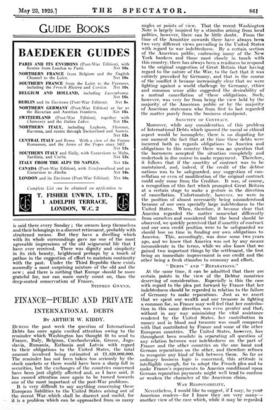A FISHERMAN'S HOLIDAY IN FRANCE
ABOUT two-thirds of the way from Dieppe to Paris a pleasant little river, seen from the railway car- riage, inevitably suggests trout. It passes through Gisors, a place of attractive and even romantic name.
The train from Dieppe gets one there about eight, not at all too late for dinner. Five minutes' walk brings you to the main street, which virtually is Gisors town— and in another two or three minutes I saw the emblematic fishes of Les Trois Poissons. Of course, the hotel was old—with such a name it was bound to be. Less inevi- tably, it was clean as Ripolin and varnish could make it. In the dark after dinner one distinguished no more than the singularly jagged profile of roofs on each side of a rising street ; but I discovered a fishing tackle shop still open, and was posted on my chances. There was no free water on the Epte : leave might be got by asking ; but the landlord of my hotel had a bonne peche, and so to him I went. The patron—who was also the excellent chef— at once handed me over to a young Frenchman staying there to fish, who would show me the water next day. And so, thanks to the possession of a rod and line, I was within two hours no longer quite a stranger in Gisors.
Probably the French male develops earlier, but this lad of eighteen was in manner and education the equiva- lent of an Englishman of three and twenty ; and not many, even at that age, would be so easily and pleasantly companionable to an elderly foreigner. Of course, I had the prestige of coming from a country where the most reputed rods originate. No fly-fisher in France will be seen without one nowadays : they wave them in your face and cry " Hardy ! " exuberantly. We talked fishing shop all the four miles to our river next day. But at one point where the road passed through forest, he broke off to tell me that earlier in the week he had found a boar hunt in progress here—not fifty miles from Paris. Sportsmen with guns were posted all along the road while dogs worked through the coverts opposite. What happened in the end was that one gentleman, not fancying his post, shifted from it, leaving a gap ; and precisely through that gap the boar bolted—unshot at.
The river when we got to it was not the Epte, but the Ferrieres, a jolly little stream, ten or twelve yards wide, with a good flow of gently swirling water ; and there were trout rising, and we failed to catch them while they did rise. I did no credit to the English-speaking race of anglers—and never shall, with the dry fly. Next day my young man got one of a pound which made him happy ; but a bearded expert came down, caught over a dozen, put back as many more, and went back to Paris. The fish are there and I have no doubt that the tales of three, or even five pounders, are true.
Going out, one had seen of course how picturesque the town is with the little river running through its centre under the huge enclosure of the old castle and past the great church ; and how charming was the rise of the street from the river as it flanked the hill which the castle crowns. But it is a place of nooks and corners, and because my fishing had not sped, I spent a sunny evening in exploration.
It was a piece of luck to hit at once on the most delightful access to the chateau. From the bridge which is the focal centre of Gisors I turned along the river, upstream where the water, walled in and rapid, passes the washing place with its old slated roof propped on old and admirably fashioned timbers ; then a footbridge crosses it and brings you out to the circle of ramparts which Philip Augustus in days of artillery threw around the thirteenth-century ring of masonry. From here a path leads up to a postern gate and you are at once in an enclosure of some three acres, covered with well kept grass, laid out with walks and seats, judiciously tree- planted and all shut in by this great wall with its dozen of towers ; while in the centre of the whole rises the original eleventh century fortress, perched in the early Norman fashion on top of a mote or steep mound, such as we all know ; but this mote must be close on a hundred feet high and of vast circumference.
I have never before seen a mediaeval stronghold so ingeniously turned into a modern pleasure ground.
As an ancient monument the place was richly worth keeping, but it has been so kept that while it tells its story historically in the plainest way, yet, if you do not care to listen to that story, there are seats and green- ness, and the song of birds; and these- great beautiful masses of masonry making a background for trees, and themselves seen against . an outer ring of greenness.
And from the terrace, where originally stood the dwelling place of the Chateau Royal, you look down on Gisors, and see a riot of fantasy in the peaked or gabled lines of its roofs ; and a riot of colour in the rose and purple, the browns and umbers of its infinitely varied tiling.
The local guide to Gisors has a surprising statement : The town, it says, has only one really old house of interest& I should have said it had hundreds.
France has something about it which gives a quicker, sharper change from town life than anything I know in England ; it has the simplicity of manners proper to a country which lives in the main by working the land. Gisors, if it were in England, would contain a large element of people who used it as a dormitory and spent their working life in the capital. I saw no trace of any such class there—indeed, I have not met it anywhere in France. Gisors is a town, it has a town life of its own, and' though its walls are nowhere traceable, yet it has its sharply defined town frontiers ; but how definitely its life is the life of a country town ! My young Parisian was almost incredulous that anything could be si province so near Paris.' Everybody was in bed by half-past ten, he said, contemptuously. Yet it had its full • equipment as a town—even its theatre, once the chapel of a Carmelite convent, whose beautiful buildings, in the best manner of the grand siècle, are used by the municipality for its varying purposes.
. Wandering outside of the town, it was natural to take the first possible turning off the high road to Pontoise and Paris ; and there, not half a mile from the racing motors, I suddenly came on an enchanting little chapel of the sixteenth century -with its end projecting into the tiny village green ; but the west front was inac- cessible, for the huge gate of the .Chateau de Beaujeu joined the southern wall and these timbered portals shut off what was no doubt the seigneur access to his private chapel. It was an impressive demonstration of seclusion; yet a few yards further along the road over- looked the great bassecour with its circular pigeonniere whose cone of roofing had fallen in ; a doorway showed sunny glimpses of the cow d'honneur and by climbing the, hill one could see the long sagging line of the chateau's tiled roof. The chapel door was locked, though mass _ , , ....({antitmed:Iya page 881.) is said there every Sunday ; the owners keep themselves and their belongings in a discreet retirement, probably with straitened means. But they have a dwelling which with its whole surroundings gave me one of the most agreeable impressions of the old seigneurial life that I have ever received. There was dignity and simplicity in its rich beauty, heightened perhaps by a touch of pathos in the suggestion of effort to maintain continuity with the past. Under the Third Republic there exists assuredly a most surprising mixture of the old and the new ; and there is nothing that Europe should be more grateful for, nor can more surely count on, than the deep-seated conservatism of France.
STEPHEN GWYNN.












































 Previous page
Previous page